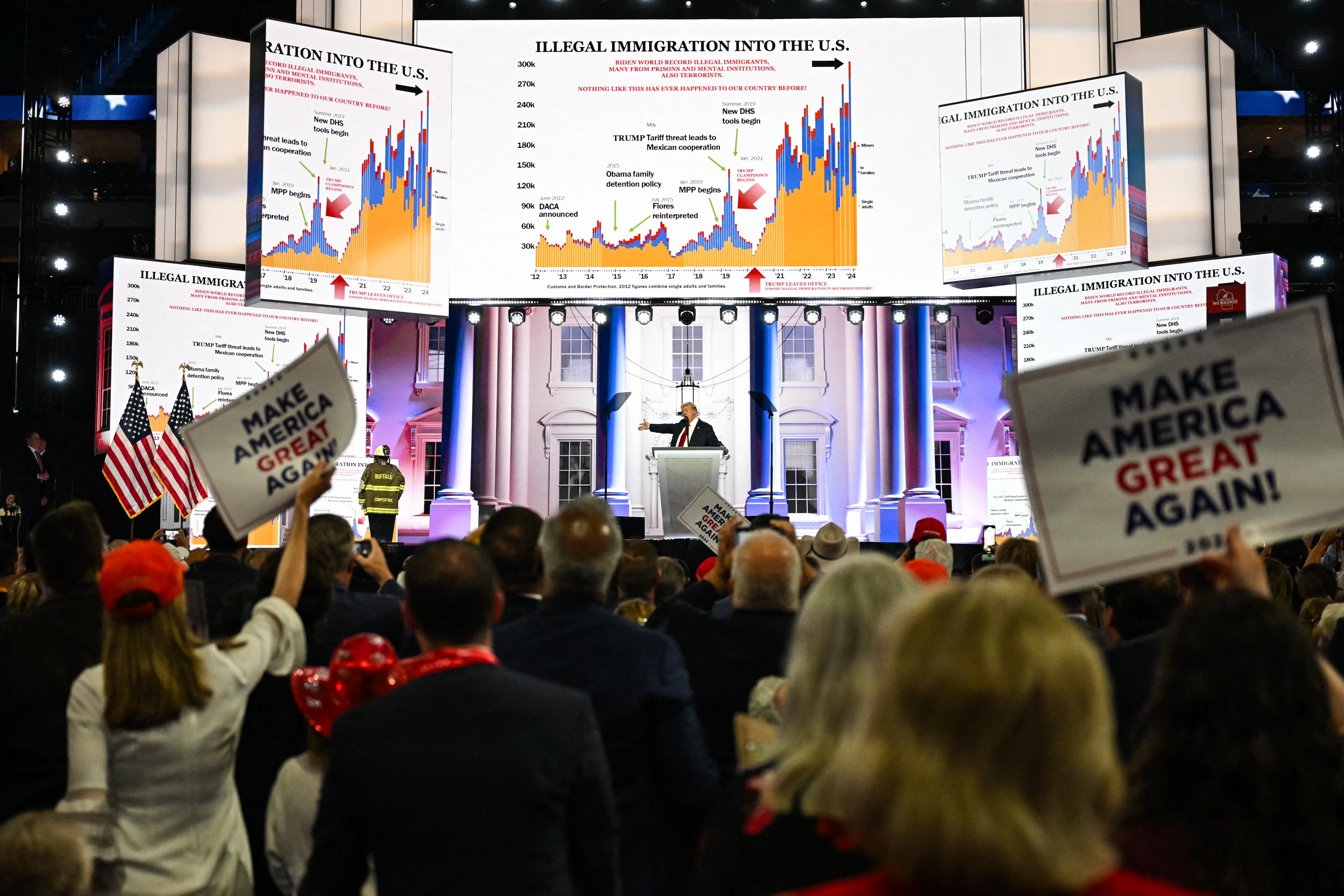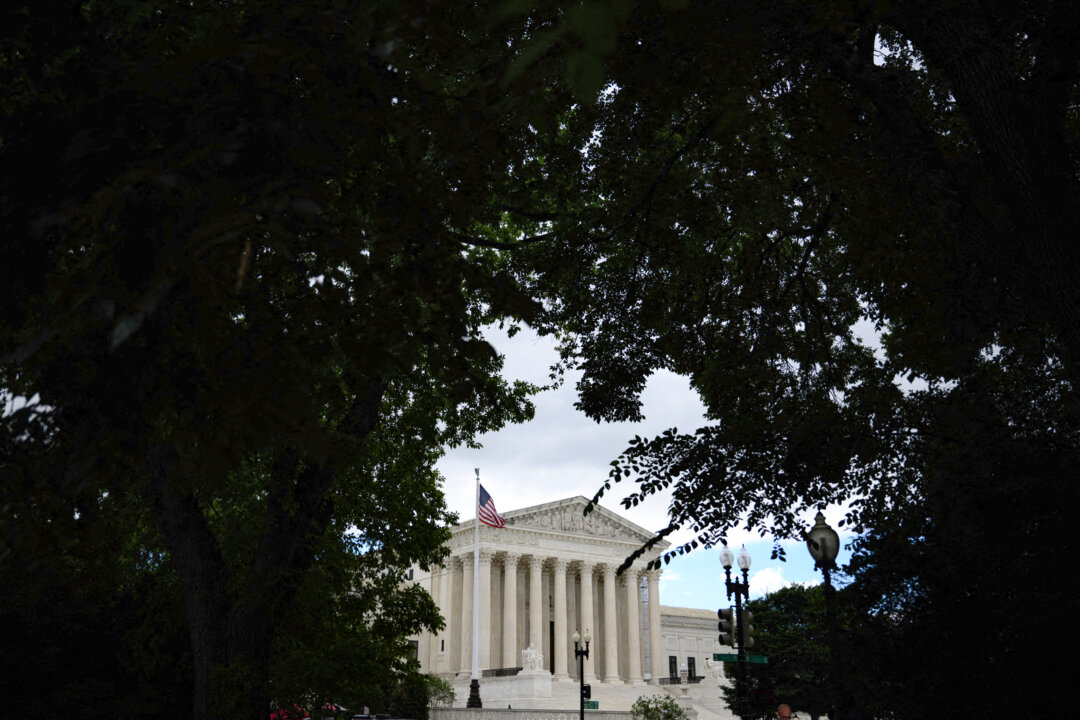Among President-elect Donald Trump’s plans for immigration is a move to end a longstanding practice of granting something known as “birthright citizenship” to children who are born in the United States of noncitizen parents, including those here illegally.
Last year, he vowed to sign an executive order directing agencies to abandon that practice, if reelected.
How exactly Trump will change policies within agencies is unclear, but experts indicate he has options.
Regardless, revoking birthright citizenship could impact waves of new illegal immigrants and change the incentives for so-called birth tourism, wherein an expectant mother arrives in the United States just before giving birth.
During his first term, Trump attempted to combat the phenomenon through a policy targeting the country’s temporary visa program.
However Trump chooses to end birthright citizenship will likely provoke a legal battle of constitutional proportions and may cause a related case to reach the Supreme Court, as Trump predicted during his first term.
The concept of birthright citizenship stems from the 14th Amendment, which states in part, “All persons born or naturalized in the United States, and subject to the jurisdiction thereof, are citizens of the United States and of the state wherein they reside.”
Lora Ries, who serves as director of the Border Security and Immigration Center at the Heritage Foundation, told The Epoch Times that Trump could start by directing the State Department and Department of Homeland Security (DHS) to interpret the 14th Amendment in a particular way.
“I don’t believe that a statute is necessary” or that a “constitutional amendment is necessary,” said Ries, who also served as the deputy chief of staff for DHS during Trump’s first administration.

Sen. Lindsey Graham (R-S.C.) has introduced legislation that would end birthright citizenship for children of illegal immigrants.
Immigration Reform Law Institute director of litigation Chris Hajec indicated, however, that a Supreme Court decision will be necessary to effect long-term change.
“A law from Congress wouldn’t be enough,” he told The Epoch Times, noting that Trump’s executive policies and any act of Congress would likely end in the courts.

It’s unclear how many individuals will seek validation of birthright citizenship in the future but the Pew Research Center estimated in 2016 that about 4 million children in the United States had illegal immigrant parents.
The Federation for American Immigration Reform, which seeks to “reduce the negative impact of uncontrolled immigration,” stated last year that taxpayers annually spend “approximately $182 billion to cover the costs incurred from the presence of more than 15.5 million illegal aliens and about 5.4 million citizen children of illegal aliens.”
While Hajec expects a Supreme Court decision on the issue, he doubts the court would somehow retroactively revoke birthright citizenship for individuals who already have it.
“I think the court would just say whether this prospective, forward-looking regulation of the Trump administration was lawful,” he said.
The court could allow Trump’s birthright citizenship policy by dismissing a challenge that arises from a lower court’s approval of it.
It could also agree to take up the lower court’s decision, likely prompting a reexamination of a longstanding precedent from the 19th century.
Supreme Court Precedent
In United States v. Wong Kim Ark, a majority of the court held that the 14th Amendment granted birthright citizenship to a Chinese man whose parents were legally present in the United States.
Some have questioned whether the reasoning in that decision applies to children of the illegal immigrants who have crossed the southern border.
“The court only held that a child born of lawful, permanent residents was a U.S. citizen,” former Federal Election Commission member Hans von Spakovsky said in 2018.

“That is a far cry from saying that a child born of individuals who are here illegally must be considered a U.S. citizen.”
Many other groups disagreed, including the American Civil Liberties Union (ACLU), which has vowed to combat Trump’s agenda.
The organization said earlier this year, “Theories that attempt to carve children out of this guarantee [of citizenship] based on the immigration status of their parents are legally wrong, morally repugnant, and dangerous attacks on a core civil right.”
The finer points of interpreting that decision could be determined by whoever is sitting on the Supreme Court when Trump’s policy lands there.
With the prospect of Justices Samuel Alito and Clarence Thomas retiring, speculation has emerged that Trump might replace either or both of them with one of the lower federal court judges he appointed in his first term.
One of those is Judge James Ho, a former Thomas clerk who serves on the U.S. Court of Appeals for the Fifth Circuit.
In an article from 2006, Ho said that a constitutional amendment is the only way to restrict birthright citizenship and argued that the 14th Amendment’s phrasing applies to illegal immigrants, who are subject to U.S. jurisdiction.
“When we speak of a person who is subject to our jurisdiction, we do not limit ourselves to only those who have sworn allegiance to the United States,” he wrote.
Citing criminals as an example, he said that “being ‘subject to the jurisdiction’ of the United States” was not “limited to those who have always complied with U.S. law.”
‘War or Invasion’
Trump could receive sympathy from a judge such as Ho and prompt more complicated legal arguments if he decides to tailor his policy to a particular situation.
Although Ho has generally supported birthright citizenship, an interview published in The Volokh Conspiracy on Nov. 11 indicated that he saw the recent wave of illegal immigrants as part of an invasion that fell outside the bounds of the 14th Amendment.
Ho told South Texas College of Law Professor Josh Blackman that “birthright citizenship obviously doesn’t apply in case of war or invasion.”
Trump has described the situation at the southern border as an “invasion” and suggested via his Truth Social platform that he would use military assets to address it.

On Nov. 18, he posted “True!!” in response to Judicial Watch President Tom Fitton stating, “Reports are the incoming @RealDonaldTrump administration prepared to declare a national emergency and will use military assets to reverse the Biden invasion through a mass deportation program.”
Earlier this year, Ho penned a concurring opinion in which he defended the idea that Texas could erect its own barrier to curb illegal immigration as part of its constitutional right to defend against an invasion.
In doing so, he compared Texas to presidents defending the United States as a whole and indicated that courts couldn’t review whether presidents had improperly designated something an invasion under Article IV of the Constitution.

Section 4 of Article IV states, “The United States shall guarantee to every state in this union a Republican form of government, and shall protect each of them against invasion.”
Declaring an invasion would seem to align with an NPR poll from 2022 when a majority of Americans said there was an “invasion” at the southern border.
In July, George Mason University law professor Ilya Somin criticized Ho’s interpretation.
He acknowledged that while “actions by non-governmental groups can qualify as ‘invasion’… it does not follow that illegal migration, drug smuggling, or other ordinary criminal activity qualify.”
Perhaps previewing future legal battles, Ho’s concurrence compared the situation at the southern border to the threat of terrorism after the attacks of Sept. 11, 2001.
In his interview with Blackman, Ho compared the issue to the debate over unlawful combatants after 9/11, noting that birthright citizenship didn’t apply to those combatants.

A similar issue arose during Trump’s first term when he attempted to prevent terrorism by barring entry from certain nations that were known terror hot spots.
The ACLU argued, among other things, that his so-called “travel ban” targeted Muslims and therefore violated the First Amendment.
Trump ultimately won at the Supreme Court, which held in Trump v. Hawaii that he acted within the bounds of his authority under a law that allows presidents to designate certain aliens as inadmissible.
It’s unclear how the current court would rule on Trump using national security as a basis for attempting to exclude certain classes of individuals from birthright citizenship.


